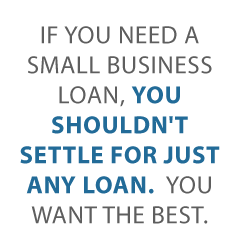- Connect With Us!
- (877) 600-2487
- info@creditsuite.com
The 4 Best Small Business Loans of 2019
Published By Faith Stewart at October 6th, 2019
And 5 Practical Tips for Landing the Best Small Business Loans
If you need a small business loan, you shouldn’t settle for just any loan. You want the best. You’re in luck, because we not only have a list of the best small business loans of the year, but we also have in depth reviews and practical tips to help you find not just the best, but the best for your specific business. Let’s take a closer look.
Where Do You Find the Best Small Business Loans?
I know, you are wondering how there can be more than one best. The best is the best, and there is only one best when it comes to most things. Business loans don’t work exactly the same way. The best loan for your business may be different than the best loan for the next business. That’s because your business will likely have different needs and qualifications than the next one.
US News handles this by naming the best small business loans in different categories. This year, these took the prize:
- OnDeck: Best Lender for Small Business Loans of Up to $500,000
- BlueVine: Best Lender for Fast Funding
- Funding Circle: Best Lender for Small Business Loans with a Low APR
- StreetShares: Best Lender with Prequalification Available
In addition to this list from US News, we would like to add our own bonus category of “Best Lender for Faster, Easier SBA Loans.” That award, in our opinion, would go to SmartBiz. They have totally streamlined the Small Business Administration loan program application process making it both faster and easier.
Well that’s all great of course, but to make a true informed decision, you need details. What makes these the best?
Learn business loan secrets with our free, sure-fire guide.
OnDeck
OnDeck offers lines of credit and term loans with fixed interest rates. You can’t get up to $500,000 with a term loan. They also have an A rating with the Better Business Bureau. The minimum FICO they require is 600. In addition, you must have $100,000 minimum annual revenue and be in business for at least one year. Find out more about OnDeck in our review.
BlueVine
BlueVine offers a number of financing options including term loans, invoice financing, equipment financing, lines of credit, and merchant cash advances. They require you to be in business for at least 6 months. If you need a term loan or a line of credit, then they require a minimum annual revenue of $100,000. If you are trying to get invoice factoring, the minimum credit score is just 530! For a line of credit or term loan, you will need a minimum credit score of 600. They have an A+ rating with the BBB. Find out more about BlueVine in this review.
Funding Circle
If you’re looking for a low APR, then Funding Circle is your go-to. They have fixed rate term loans and require a credit score of 620 or above. There is no minimum revenue requirement, but they do require you to be in business for at least 2 years. They have an A+ BBB rating. Find out more in our Funding Circle review.
StreetShares
This is considered by US News to be the best lender with prequalification available. They offer invoice financing, term loans, and lines of credit. The number of years in business requirement is one. They require less minimum annual revenue than the others at only $25,000. The minimum credit score is 600, and they also have an A+ rating with the Better Business Bureau. You guessed it. You can find out more about StreetShares in our review, here.
SmartBiz
SBA loans typically take a lot of time and paperwork. SmartBiz found a way to speed things up, making it easier than ever. The requirements are a little more strict however. Your credit score has to be 650, and you have to be in business for 2 years or more. In addition, annual revenue has to be $50,000 at least, and there can be no outstanding liens, bankruptcies, or foreclosures in the past 3 years.
Tips for Landing One of the Best Business Loans
1. Appear Fundable
What is fundable? A business that appears fundable to a lender is an established business separate from its owner. It is complete, organized, and either has solid revenue or a solid plan if a startup.
To appear fundable, a business needs:
- To be formally incorporated as an S-corp, LLC, or a corporation.
- An EIN from the IRS. This is an identifying number for your business that function similar to the way your SSN does for you personally.
- A dedicated business bank account.
- Contact information that is different from the owner’s. A separate telephone number on a toll-free exchange and a dedicated physical address are imperative.
- A professional website and an email address that has the same URL. Free web hosting and email services won’t do the job in this case.
2. Have a Killer Business Plan
Lenders are also going to want to see a professional business plan. Even if you are not a startup a plan is necessary. Startups have to show what they are planning and that they have done the research to make it work. Established businesses need to show how they plan to use the funds, and that they have research to show the market supports that plan.
At a minimum, a business plan should have the following sections.
- An Executive Summary– This is a complete summary of the business idea.
- Description– The description goes into further detail than the summary, describing the business. What type of business is it? What product or service will it offer?
- Strategies-Layout your plan for getting started. Do you have a marketing plan, area in mind for location, or idea of how many employees you will start with?
- Market Analysis– All that market research you did goes here and should include not only a market analysis but an analysis of the competition as well.
- Plan for Design and Development: How is all of this going to play out, from start to finish. What steps are you going to take? This is more detailed than your strategies section.
- Plan for Operation and Management– Who will own or does own the business and who will run or currently runs it from day to day.
- Financial Information– This section includes current financials, projections, and a budget plan for the loan funds you are applying for.
3. Be Prepared
It is almost impossible to over prepare when applying for a loan. Anticipate any questions they may ask. Pull together any forms or documentation they might ask for. Items such as past tax returns, financials, and licenses are common. The more you have ready to go before you start, the faster and easier the process will be.
Learn business loan secrets with our free, sure-fire guide.
4. Have Solid Personal Credit
You need a solid personal credit score to land the best small business loans. There is just no way around it. As you can see above, a score of at least 600 is required almost across the board with the exception of some invoice factoring options. If you do not have this score however, all is not lost.
It is possible to improve your personal credit score. The first step is to get a copy of your credit report. You can get a free copy each year. Look for what may be impacting your score negatively. If there are mistakes, contact the credit agency in writing to have them removed. If late payments are a problem, start paying on time. Knowing what you need to work on is the first step.
5. Have Solid Business Credit
Of course, when it comes to the best small business loans, you cannot ignore business credit. While it isn’t listed as a primary requirement for most lenders, it can only help you to have strong business credit.
If a lender sees a personal score that isn’t exactly what they need, it is possible they will take business credit into consideration when making their decision. In addition, if you qualify and have stellar business credit, you may be able to get a lower interest rate.
More Benefits of Business Credit
Since business credit is the one topic out of these 5 that people seem to question the most often, let’s talk about why it’s important. There are a number of reasons. The first one is, if you have business credit, your business transactions will not affect your personal credit report.
You may be thinking that it doesn’t matter, because you pay all your bills anyway. You would be wrong however. It absolutely matters. Here’s the thing. Personal credit cards often have lower limits than business credit cards. Conversely, business expenses are typically much higher than personal expenses. This means, if you are using personal cards for business expenses, you are likely to keep balances at or near your limits.
Consistent balances near your limits has a negative impact on your credit score even if you are making regular payments. If you have business credit cards, your limits will be higher and better able to accommodate the high expense of running a business.
How do You Get Business Credit?
The steps to looking fundable are also the first steps toward business credit. Your business has to be separate from yourself before business credit can be established. In addition, you will need a D-U-N-S number.
This is a number from Dun & Bradstreet that they use to enter you into their system and issue a business credit score. If you do not have a D-U-N-S number you will not have a credit file with them. Since they are the largest and most commonly used business credit reporting agency, you need to have a business credit profile with them. Get a D-U-N-S number for free on their website.
How Do You Get Business Credit if You Do Not Already Have It?
If you do not yet have business credit, you will need to open accounts in the vendor credit tier after you finish these steps. We all know that it is almost impossible to get credit if you do not already have credit. However, the vendor credit tier consists of vendors that will offer net 30 terms without a credit check, and then report your payments to the credit reporting agencies. After you have enough of these types of accounts reporting, you will have a credit score and be able to apply for accounts from different types of companies to grow it even more. Find out more about the vendor credit tier and building credit here.
Keep an Eye on Your Credit Reports
Both credit scores are so vital to being able to get the best business loans, it is important to talk about monitoring them. With personal credit scores, this is easy. You can get a free copy of your personal credit report every year. In addition, there are numerous websites that allow you to monitor your credit on a monthly basis for free.
Business credit monitoring isn’t as easy, and it definitely isn’t free. The credit agencies charge from $50 to over $100 for just one report. You can monitor your business credit at a fraction of the price at https://oldcs.creditsuite.com/monitoring.
Don’t Forget Traditional Lenders
These business loans are from non-traditional lenders. This is because non-traditional lenders are generally more friendly toward small businesses than the traditional banks. Do not neglect to check into what your local traditional lenders may have available however. If your personal credit score is above 650, they may very well offer even better rates and terms than those listed above.
While big banks are not typically friendly toward small businesses, local community banks can be favorable if your credit is strong. Credit Unions are another option if you have a good credit score and are a member. Do your research before making a final decision.
Learn business loan secrets with our free, sure-fire guide.
The Best Small Business Loans Can be Yours
How do you land the best small business loans of the year? In short, you prepare. Do a fast check to ensure your business will appear fundable to lenders. Do some research to determine which loan options best fit your needs and qualification abilities. Don’t forget to see what traditional lenders have to offer as well. Get all the necessary paperwork, including your business plan, together before you begin the process. Then, take note of both your personal and business credit scores and determine if you need to make some adjustments to improve them. With these items checked off your list, the best small business loans really can be yours.

 " class="attachment-blog-single size-blog-single wp-post-image" alt="Get Business Credit Cards for New Businesses Credit Suite-Business Line of Credit Decoded" title="Get Business Credit Cards for New Businesses">>
" class="attachment-blog-single size-blog-single wp-post-image" alt="Get Business Credit Cards for New Businesses Credit Suite-Business Line of Credit Decoded" title="Get Business Credit Cards for New Businesses">>
